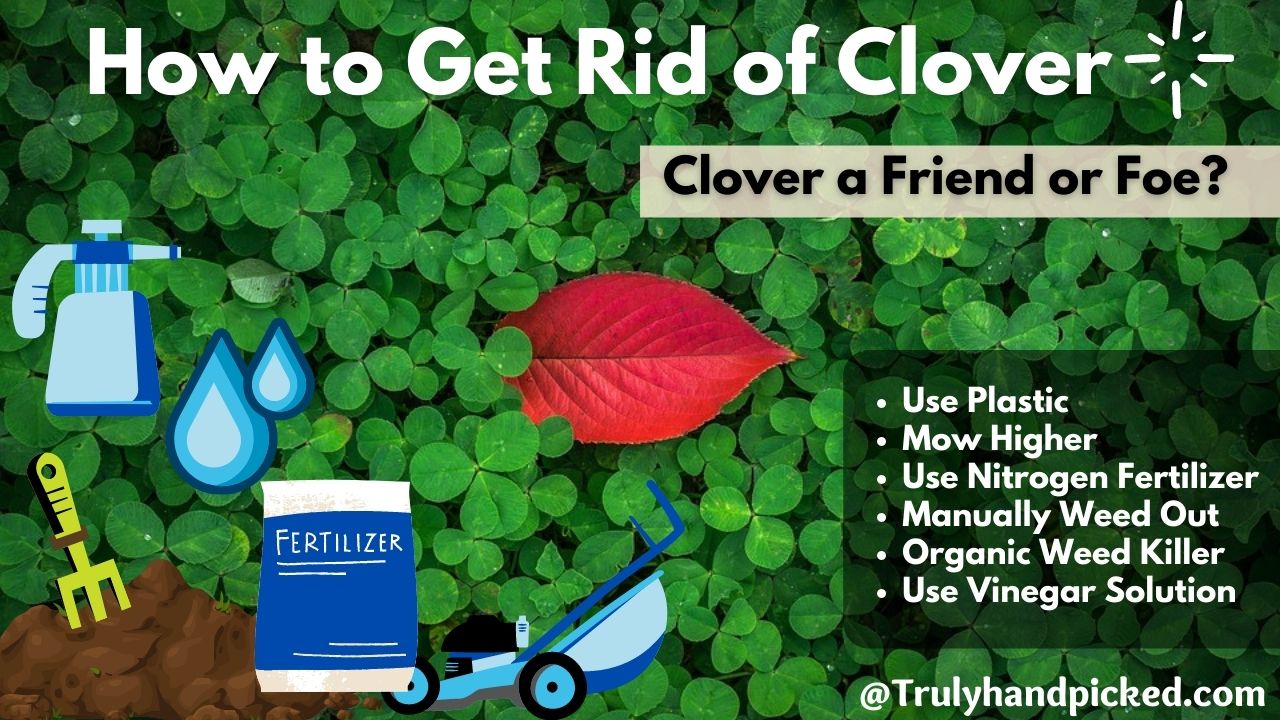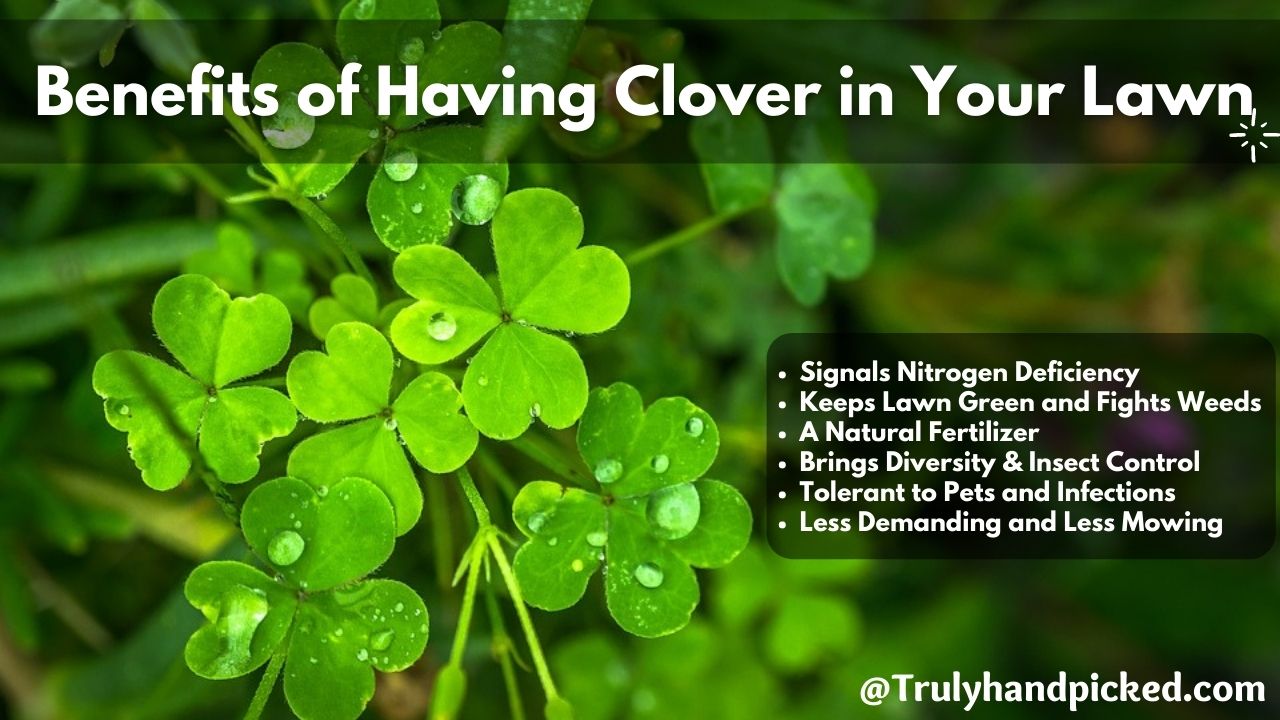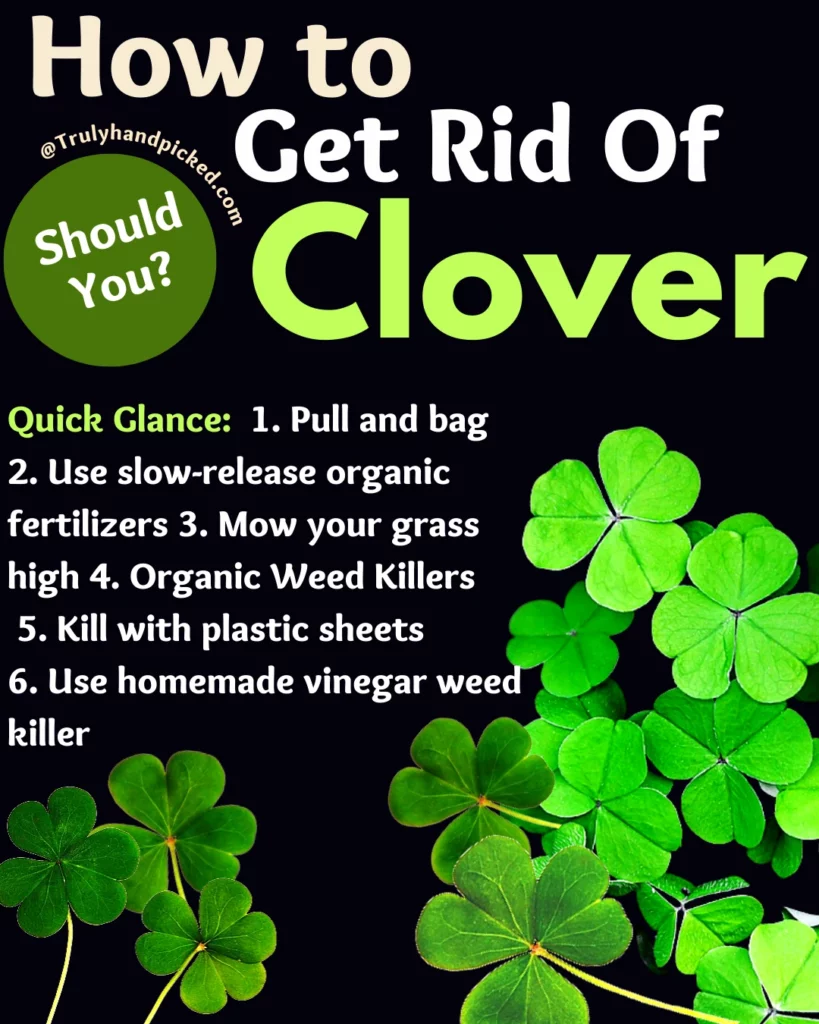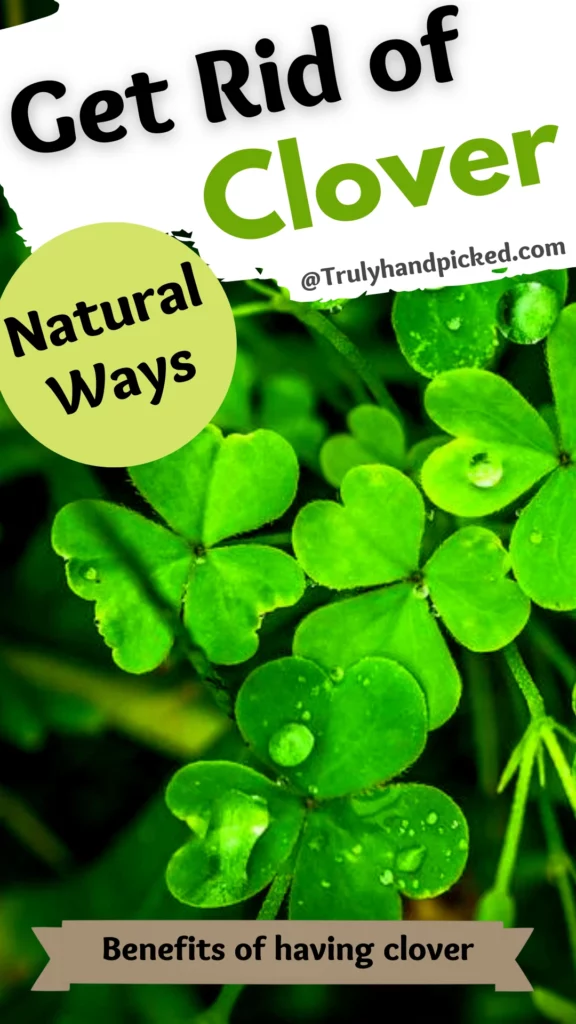Any plant that turns useless for a gardener is a weed. Clover falls under that category, though it is beneficial for a lawn. If you want it out from your lawn then let’s check out some quick ways to get rid of clover.
How to get rid of clover weeds: 1. Pull and bag 2. Use slow-release organic fertilizers 3. Mow your grass high 4. Organic Weed Killers 5. Kill with plastic sheets 6. Use homemade vinegar weed killer
Use Corn Gluten as a Natural Pre-emergent Herbicide:
Alternative to synthetic chemicals you can use corn gluten to suppress weeds in your lawn. It is safe for people and pets, so you happily use it without any hesitation.
You will need nearly 2 pounds of corn gluten for every 100 sqft of your lawn area. Spread it evenly and water light to activate the corn gluten to start its process, which can suppress the emerging seeds.
Corn gluten will remain effective for the next 6 weeks, and it’s not just for clovers it is good for the majority of the summer, winter, and annual weeds.
This weed seed preventer is not just a pre-emergent herbicide it is also known for its nutritional properties to enrich your soil. It is better you start applying corn gluten in early spring and also in early fall or late summer.
How to Get rid of/Kill Clover in Your Lawn Naturally
Unless these benefits are not your concern and you don’t want a mixed grass-clover lawn, the following list of treatments will help you to get rid of clover.
1. Pull and bag it manually
Use a garden fork to loosen the soil around the clover spot slightly shake them up and use a bag to collect the uprooted clover. If you leave the roots or parts of the plant on the ground they can easily shoot up and spread in no time.
Related: Best fast-growing ground cover plants
2. Use fertilizers to weed out clover
Clovers won’t do well on nitrogen-rich soil, so feed your lawn with organic slow-release fertilizers like cow dung, seaweed, compost/vermicompost, and bone meal.
Organic fertilizers suit for a small patch but if the clovers are well spread and established it is advisable to go for nitrogen-rich regular fast-release fertilizer which makes your soil, less hospitable for clovers.
3. Use organic weed killers to kill clover and not the grass
If you prefer natural ways to win clovers go for organic herbicides like A.D.I.O.S. or organic weed killer/herbicides mixed along with a few drops of dish soap in water.
This is non-toxic and safe for grass lawn and pets yet kill clovers, dandelions, mustard, and similar weeds.
Spray on clover and weed spots to make it stick to the leaves and later weaken the weeds to die and decompose and this doesn’t affect your grass.
Few gardeners use synthetic weed killers to get faster results, but it’s recommended to keep chemicals as last resort.

4. Using plastic to kill weeds
Use dark-colored plastic sheets or garbage bags to cover clover or weed patches. Secure them by burying the edges, or placing small rocks to keep them in place.
This will block oxygen, and sunlight and literally kill anything under this hood, weeds, clovers, and yes grass too. So it’s recommended to use this method for patches only where you can reseed and grow grass or plants later.
You may also be interested in ways to get rid of horsetail weeds and weed off dandelions.
5. Prevent clovers by mowing your grass high
Clover is comfortable with lawns soil less in nitrogen and where the grass is short and not above 3 inches.
This directly means you should mow your lawn any lesser than 4 inches which makes deeper grassroots and it outcompetes clovers. Also prevents clovers from spreading around by blocking sunlight exposure.
6. Homemade vinegar solution to kill clovers
Mix equal parts of vinegar and water with a few drops of dish soap and spray on clover spots. The dish soap helps to keep the solution in place rather than roll over and drop.
Though this won’t instantly help you to get rid of clovers, it may in a few weeks of application. Note, this may affect other plants and grass so it’s only for exact spots and weed clumps.
Before that let us have a quick overview of clover and know if should you remove clover from your lawn.
Benefits of Having Clover on Your Lawn (Friend/Foe)

1. Keeps Your Lawn Fresh and Signals Nitrogen Deficiency: Clover mainly grows in soil that lacks nitrogen, in other words, clover doesn’t need fertilizers to keep your garden green and fresh with a relaxing mild smell.
Also, it’s a sign that your soil is nitrogen deficient. Contrary to the misconception that clover may choke grass is totally wrong instead it encourages grassroots for a greenish lawn.
2. Keeps Lawn Green and Fights Weeds: A lawn with clover stays green even in dry spells while a few types of grass turn brown. You can grow clover with little watering to compete and win over weeds. Later when clover roots die it fertilizes your soil for foliage plants.
3. A Natural Fertilizer: Clover helps to fix nitrogen in your lawn soil. Whenever the clover dries up or is mowed, the accumulated nitrogen in its roots gets released into the soil. That gets readily available for other foliage plants.
4. Brings Diversity & Insect Control to Your Garden: Apart from the lawn if you have some fruit or vegetable plants in your garden, leaving clover on the lawn will attract bees to help in pollination. And such a diversified lawn keeps diseases and insects under control.
5. Less Demanding and Less Mowing for Green Cover: Clover doesn’t demand rich soil and is even good to go on hard soil beyond that it needs less maintenance in mowing to keep them in the desired length.
6. Tolerant to Pets and Infections: There is no need for herbicide or fungicide as it fights infections and weeds and can tolerate pet urine to avoid brown patches and discoloration. Clovers are cheap to maintain and an ideal choice for your lawn with less foot traffic.
Is Clover Bad for Your Lawn: Clover a Friend or Foe
Why my lawn is full of clovers? It’s a sign your soil is acidic in nature, nitrogen-deficient and your lawn grass is less than 3 inches. Especially white flower clovers thrive in mildly acidic soil with a pH below 6 rather than neutral pH range or alkaline soil.
What fertilizer to use to kill clover? Nitrogen-rich fertilizers will slowly weaken and kill all types of clovers.
Will clover take over or choke my lawn grass? No, the helps to keep your lawn diversified and enrich the soil with nitrogen which actually helps to keep your lawn green.
Does clover die in winter and summer? Yes, it won’t tolerate extreme heat and cold and eventually, die and comes back later year after year when climate and soil conditions turn hospitable.
Even leaving a single clump can bring them back to life. Again it will be at your service to add nutrients and fix nitrogen in your soil along with symbiotic rhizobia bacteria.
When do clovers bloom? Starting from spring white clover bloom and have flowers for months together, yet it varies with types of broadleaf clover.
How long will it take for clover to germinate and establish?
Clover doesn’t take more than 7 – 10 days. If the soil and climate conditions are in favor it would sprout within 3 days. In a month’s time, it rapidly spread its dense web of roots with nodules to establish itself. Pinkish root nodules mean that the plant was actively fixing nitrogen in the soil.
Clover as an alternative for a good green cover:
No, it won’t suit to cover the whole area of your lawn. White clover (Dutch or dwarf clover) is commonly used along with grass for a mixed grass-clover type lawn to keep your lawn greenish.
Annual and Perennial Clover:
Annual clovers like crimson, arrowleaf, berseem, and similar clovers will complete their lifecycle from seed to spreading seeds within 12 months’ time. Perennials on the other hand die from season to season and later develop from roots and spring back to life. While annual clovers have one advantage of growing and establishing faster to produce flowers before frost.
Should you remove clover from your lawn?
It depends on you if you want a uniform grass-only green lawn then it’s a yes. Actually, clover was not termed as a weed as we do now.
Chemicals marketed to kill weeds staged clovers and similar plants as a foe rather than a friend for your garden. Bad branding made clover a victim while it’s beneficial for your lawn with less watering, fertilizers, low maintenance, less weeding, and mowing. Also, it invites pollinators like bees and butterflies to keep your lawn and whole garden fresh and lively.


Have tried some home remedies to get rid of clover. But, why am having clover all over my lawn?
Hello Julia,
Mow your lawn high and make your soil rich enough for grass to dominate to get rid of clover.
Lack of enough nutrients in your lawn soil is making the clover’s way into your lawn. Try the above-mentioned ways to add value to your soil with natural or readymade fertilizers for your lawn.
Hi Guru,
Does clover choke the lawn grass and damage my lawn?
Hello Mia,
Clovers are usually beneficial for your lawn as they fix nitrogen in your soil. Mowing will reseed clover along with returning nitrogen to the soil. Which is one way or another gonna benefit your grass for lush growth and suppress other weeds.
Though you can get rid of clover, we suggest letting the beneficial clover grow and coexist with your lawn grass. Apart from us clovers are good for the ecosystem.